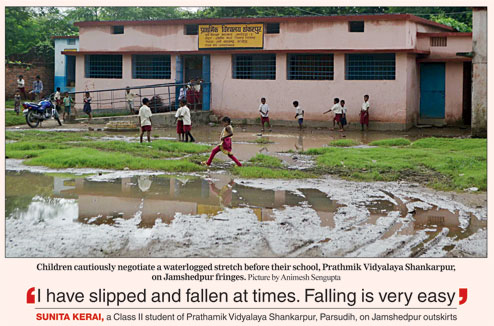
Once a cradle of academic excellence, Netarhat Vidyalaya in Latehar, some 200km from capital Ranchi, is plagued by poor board performance for at least three years now, a trend that is worrying both the school management and the state education department.
Out of the 87 students who appeared for this year's matriculation conducted by Jharkhand Academic Council (JAC), only four did exceptionally well although everyone cleared the examination. For decades, most of the top 10 achievers had belonged to this school.
Similarly, in intermediate 2017, none of the five students who took the examination are believed to be in the top bracket although JAC is yet to formally declare the names of achievers.
Speaking to this correspondent over phone, school principal Vindhyachal Pandey blamed an indulgent process of admission for the declining quality of students.
Set up in 1954, Netarhat Vidyalaya in undivided Bihar used to conduct its own entrance test, which was no less daunting and prestigious than current competitive exams. Ever since Jharkhand was formed in 2000, the responsibility of screening candidates has been handled by JAC, which allegedly ends up recommending "undeserving" students.
This year, the government once again entrusted the residential school with the admission test task, but the process is currently in limbo reportedly because of state objection to intake of students from outside.
"The Netarhat Vidyalaya entrance used to be a three-tier system. Subjective tests were first held at designated centres in every district. Those who cleared the test took an objective exam on the campus, which was following by a psychological screening and interview. This ensured that we enrolled the cream of the crop," Pandey recalled, underscoring that the process was held round the year for best results.
However, after JAC took over the admission duty, the school management was only left with the job of conducting medical test of recommended candidates. "If you realise that a particular student is not up to the mark after admission, there is not much you can do, which has mostly been the case," Pandey added.
The elite cradle has a maximum of 100 seats in every grade and students are normally enrolled in Class VI to ensure complete grooming by the time they reach Class X and XII.
Another senior school official, not willing to be named, said it shouldn't come as a surprise if they failed to churn out achievers till 2020. "This is because students who will appear for their boards in 2020 will be the ones currently recommended by JAC," he said.
The official added, "Unless you open the door to students from outside the state, you cannot expect good quality. Out of the total 100 seats, 30 to 40 should be set aside for all-India students. This was done in undivided Bihar. The problem in Jharkhand is that the quality of primary education is poor. So, you can never expect the cream to join Class VI."
Asked about infrastructure, principal Pandey said it was not a problem. "Civil infrastructure is no issue. The government gives us enough grant. We are coming up with one more ashram by this year-end. It will accommodate 600-700 students."
On teacher strength, the principal said of the 47 sanctioned posts, 10 were vacant. "In another year or two, half a dozen more will retire. If I am not wrong, the last hiring was done in 1996."
Another senior administrative official suggested that teachers should be recruited through a state commission exam. "As of now, hiring is down through the Vidyalaya Samiti, which stands dissolved at the moment. The state should rethink on the process," he added.
State secretary of school education Aradhana Patnaik refused to agree that quality of students in the state had declined. "A girl from a government school in Dumka became the matriculation topper. Quite clearly, teachers there are working harder (than those in Netarhat)," she said.
Patnaik, however, conceded that the dismal performance of the school in JAC exams called for review.
"The government has started brainstorming on ways to revamp education (at Netarhat Vidyalaya). During an inspection last year, students had told me that they felt completely cut off from world. I had directed JAP-IT to set up Internet laboratories. We also worked on library revamp. A general body meeting will be convened soon to form a new executive council at the school to catalyse upgrade," she added.
What do you think is wrong with the state's education system? Tell ttkhand@abpmail.com










